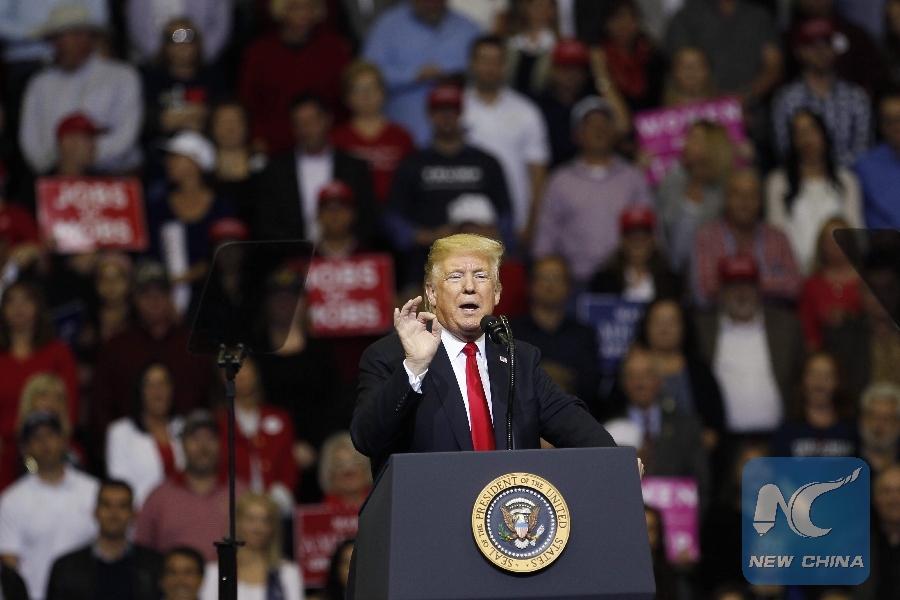Midterm election 'blue wave' fails to appear
- By Sumantra Maitra
 0 Comment(s)
0 Comment(s) Print
Print E-mail China.org.cn, November 13, 2018
E-mail China.org.cn, November 13, 2018

Amid all the talk of an event that might change and reshape the map of the United States, the midterm congressional elections proved to be a dud. The "blue wave," named after the color signifying the Democratic Party, was not a wave, it was not even a ripple on a puddle.
In fact, the Republicans (identified by the color red) increased their Senate presence for the first time since 2005. The Democrats managed to wrest back control of the House of Representatives; but how much of that is going to be relevant to Trump's foreign policy remains to be seen. By my calculation, not very much.
From the look of it, it was very much a rejection of Democratic identity politics and social policies. For example, in Vermont, the state of the leftwing presidential candidate Senator Bernie Sanders, a Republican won a governorship standing against a Democratic candidate who was a man transitioning to a woman.
In Georgia a former race activist lost to a Republican candidate. In four other too-close-to-call Senate seats, the Democratic incumbents lost, all of them having voted against the Supreme Court nomination of conservative Judge Brett Kavanaugh.
The backlash against hardcore feminist issues continued, as working-class whites, and especially white women, and a significant section of Asian Americans and Hispanics, coalesced around Trump. In California, the first ever Korean American candidate named Young Kim won for the Republicans.
The Democrat gamble of feminism, identity politics, and LGBT rights, fell flat. The Democrats who were middle and working class and focused on jobs, did well, including a candidate in heavily Republican Texas.
The next thing to observe is that, if the Trump administration is checked by Democrat balancing of the House. He's well prepared. He started firing with all guns in a tempestuous post-election press conference and firing his Attorney General Jeff Sessions, showing he is preparing for a partisan siege, backed by a solid showing of working-class votes.
Of course, he could be facing more investigations now the Democrats control the House, seeking to probe his pro-Russia politics. Likewise, Trump might face some opposition on trade. However, his overall foreign policy is unlikely to change.
First, all of Trump's politics are predicated towards a domestic audience. Midterm elections were part of the calculation. Trump's core support base doesn't care much about the details of politics, but likes to hear catchphrases, like "deal" and prefers a president who they view as the architect of this incredible achievement.
The nitty-gritty of the deal remains irrelevant and often lost in the new cycle. For Trump whose motivation was to keep his 2016 presidential election base solid, this serves a political purpose and is a clever winning strategy.
That being said, the elections vindicated a domestic policy predicated on jobs. Every Democrat who ran on the issues of feminism, overreaching on judicial nominations and street protests, lost in vulnerable states – just like every Republican who ran on a hard right nativist platform.
The ones who did well, like Robert "Beto" O'Rourke in Texas, for example, ran on the platform of jobs and unity. If Trump continues this trade war, and if he cannot provide the jobs for his fellow countrymen as promised, his reelection bid in two years is over.
This also means, anyone willing to invest in jobs in Trumpian heartlands, has a say in future American domestic politics.
The second point to be considered is a climbdown for Trumpian economics. The zero-sum economy game is obsolete in this era of global ties and interdependence.
In the short term, U.S. policy, therefore, is likely to be erratic; however, in the long term, there is unlikely to be any significant change. Especially in foreign policy, American retrenchment, and on trade, American mercantilism and protectionism will continue.
Sumantra Maitra is a columnist with China.org.cn. For more information please visit:
http://www.china.org.cn/opinion/SumantraMaitra.htm
Opinion articles reflect the views of their authors only, not necessarily those of China.org.cn.






Go to Forum >>0 Comment(s)